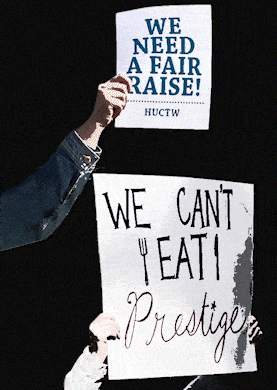Last Friday, the Harvard Union of Clerical and Technical Workers (HUCTW)—the University’s largest labor union—ratified a new contract that significantly raises pay, strengthens protections for flexible work, and bolsters the criteria for compensating employees who take on extra duties. During the next three years, HUCTW members will receive four raises, which, for a worker earning the median salary of $64,000, will mean a 19 percent increase in base compensation. Ratification was overwhelmingly approved, by a vote of 89 percent.
The contract comes after 13 months of difficult negotiations that had deadlocked over the issue of compensation. As talks dragged on, union members held rallies, picketed, and took part in a letter-writing campaign to push for support among faculty members and deans. Last November, at an impasse, HUCTW and the University began working with a third-party negotiator. More recently the two parties engaged a different pair of facilitators: Bob Bordone, J.D. ’97, a senior fellow at Harvard Law School and founder of its clinical program in negotiation and mediation; and Lawrence Katz, Allison professor of economics and an expert in labor economics.
The resulting agreement reflects, in part, how the pandemic has altered American work life during the past few years—and how it has affected the American economy: negotiations over the contract’s main sticking point, employee pay, unfolded in the context of record-high inflation rooted largely in pandemic-era disruptions to supply chains and consumer demand.

“We’ve always tried to negotiate raises that stay ahead of inflation,” says HUCTW president Carrie Barbash. But this time, that became especially difficult. In 2022, the U.S. annual inflation rate was 8 percent, the highest in 40 years, and at times inflation surged as high as 10 percent (during the previous decade, average annual hovered just below 2 percent). “So, a large part of the disagreement during this negotiation was over the question of, does the University have an obligation to help us ensure that members can keep up with inflation?” says Barbash, who recalls hearing from union members last year who were suddenly having trouble paying rent and utility bills, or could no longer afford child care, or were drawing on retirement accounts to pay for everyday expenses. For her and other union leaders, she says, the central focus in contract negotiations became, “just the actual amount of dollars we could put in members’ pockets.”
A University spokesperson declined to comment directly on the contract or negotiations, beyond a joint statement released with HUCTW: “Harvard University and the Harvard Union of Clerical and Technical Workers are pleased to announce that they have reached Agreement on a new contract covering the period between October 1, 2022, and June 30, 2026. The Agreement provides for four pay increases and addresses several other important policy issues of mutual interest to the Union and the University.”
The first pay raise—5.9 percent for a typical HUCTW member—covers the nine months from September 30, 2022, when the previous contract expired, through this June. Employees will receive that raise as a lump sum, along with a one-time bonus of $1,400. Three further raises will follow on July 1 of each year: 4.7 percent in 2023, 3.8 percent in 2024, and 3.5 percent in 2025.
Those percentages will vary a bit depending on salary, Barbash explained: for employees at the lower end of HUCTW’s pay range, the first increase will be closer to 7.6 percent, and for those at the higher end, more like 5.5 percent. Representing more than 5,000 members, HUCTW covers a diverse pool of employees, both full- and part-time, who work in Harvard offices, laboratories, libraries, museums, houses, and clinics. Their salaries range, she says, from about $35,000 per year to $105,000 per year. All those diverse factors add complexity to the process of drafting contract terms.
Besides pay, the new contract addresses other aspects of pandemic-era employment. “Not surprisingly, one of our big issues was remote work,” Barbash says. At least 85 percent of HUCTW members now have remote or hybrid work built into their schedules: “After COVID, it’s basically a fixture of people’s jobs.” Previously, there was no uniform procedure for handling requests for workplace flexibility, and policies vary widely among departments . Given the breadth of job types under HUCTW’s umbrella, she continues, the union wanted to establish a set of criteria for allowing flexibility, which includes not only remote or hybrid work, but also flexible hours, compressed work weeks, and other nontraditional arrangements. The contract’s new terms expand and reinforce guidelines that managers should focus on business needs and job duties when making flexibility decisions, rather than “sweeping statements about department culture,” Barbash says, “that don’t seem to be based on whether that person can do their job from home.”
The contract also codifies new policies concerning reduced staffing and extra work. During the pandemic, many employees took early retirement or left the University, and some of those open positions went unfilled for long periods as the labor market tightened. “And so a lot of our members were doing extra work, more than usual,” she says. HUCTW’s contract has always specified that employees should be compensated for doing work beyond their normal duties, but during the past couple of years, “a lot of people reported taking on extra duties and not getting paid for them—not because of ill will, but just because there’s a feeling of, we’re all chipping in and doing more,” Barbash says. “But our members are hourly workers, they’re not salaried.”
Overtime pay has long been required for HUCTW members doing general work beyond their regular hours (for those who work longer than 40 hours in a week the extra pay is 1.5 times the regular hourly rate), but the new contract specifies criteria for calculating extra compensation when the additional work involves the specific duties of an absent coworker. That calculation accounts for the absent coworker’s salary and what fraction of that job’s duties the union member shoulders.
And importantly, the new contract also states that managers should be the ones to initiate conversations about extra pay. “It’s been largely the case that getting that extra money relies heavily on the member bringing it up,” Barbash says. That can be an uncomfortable position for an employee, “So I think this is a really important detail that will help a lot of people.”
Among other contract highlights:
- Expanded eligibility for union membership. Previously, only employees working in Massachusetts or at Dumbarton Oaks in Washington, D.C., were eligible for HUCTW membership, but now clerical and technical employees in any state where Harvard is registered to conduct business (more than a dozen states) can join the union.
- Extra pay for early-morning shifts. Previous contracts have allotted an extra $2 per hour for members who work evenings and weekends, and the new agreement boosts compensation for those who start work earlier than 7 a.m. as well. “So, 3 a.m., 4 a.m., 5 a.m., the really annoying, unpleasant hours,” Barbash says. This group includes lifeguards, animal-care workers, library employees, and others in facilities—“folks who need to be available at odd times of the day for students, faculty, or animals.”
- Permanent tax reimbursement for Harvard courses. The University’s Tuition Assistance Program (TAP) allows employees to take classes at steeply reduced rates, but for graduate-level courses that are not job-related, those benefits—worth thousands of dollars per course—are taxable. The new contract makes permanent a fund the University set up four years ago on a temporary basis, to reimburse members for TAP taxes. Recently, union leaders found that over a three-year period, 2,500 members had taken a Harvard course. “Most of our members, at some point or another, will take a Harvard class,” Barbash says.
- Expedited mediation for terminations. Workers fired for cause can appeal the decision using HUCTW’s grievance process, but often it can take months to reach a resolution, especially in cases of termination, when the two parties are so at odds that arriving at a compromise may be impossible. “And during that whole time,” she says, “the member has no pay.” The new contract enables workers appealing a termination to skip the first two steps of the grievance process and go straight to a one-day mediation.
Barbash credits numerous factors for helping to bring the negotiations to a conclusion. “This was a long, hard process, and there were so many people involved in different ways,” she says. That includes Bordone and Katz, who were instrumental, she says, in helping union leaders and University administrators see each other’s points of view. Katz, in particular, she says, brought in crucial knowledge about inflation and its effects.
Hundreds of union members got involved too, participating in rallies—more than 250 people showed up for one in March—and picketing in front of Massachusetts Hall three times a week for months. “We’ve gone through a season or two out there,” Barbash says. Late last fall, HUCTW launched a letter-writing campaign, encouraging members to write directly to University negotiators about their personal financial situations, and encouraging them to ask for support from faculty members, deans, and supervisors—who, in turn, wrote their own messages to administrators. Harvard officials received letters nearly every day, she says—thousands in all. “I think it was really powerful,” she says. “And a lot of administrators responded to those letters. They didn’t just ignore them—they wrote back.”
Barbash believes all this had an effect. “I think people feel good that they were part of this fight. And that we came out of it with something good.” Overall responses from members have been “extremely enthusiastic,” she says, although she acknowledges that 11 percent of members voted not to ratify the contract. “I totally get the frustration,” she says. “There were people who wanted us to hold out for longer and go on strike,” to push for higher raises. “That’s very understandable. But we have a whole big wide membership, who have different views on all parts of this, and we’re trying to balance that.” She feels good, she says, that workers will receive a “nice chunk of money” this month when contract is implemented. “For people who have been falling behind and struggling, that money up front will be helpful.”









